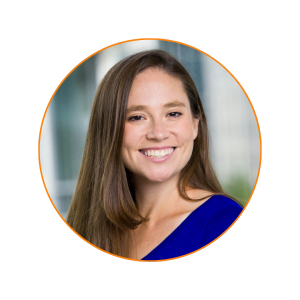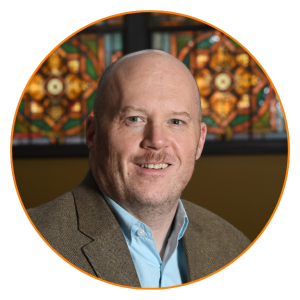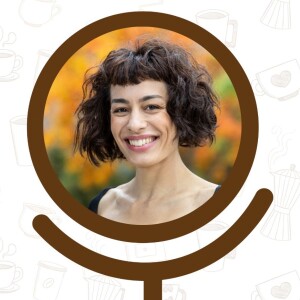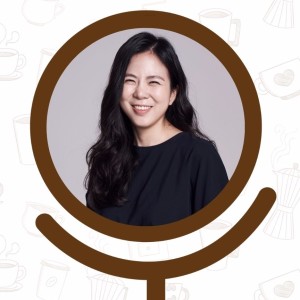Fueling Creativity in Education
Episodes

Tuesday Apr 08, 2025
Innovation in the Classroom with Jaap Haartsen and Jayme Cellitioci
Tuesday Apr 08, 2025
Tuesday Apr 08, 2025
Sign up for our weekly newsletter here!
Listen to Part One of this Double Expresso here!
In this episode of the Fueling Creativity in Education Podcast, hosts Dr. Cyndi Burnett and Dr. Matthew Worwood continue their dynamic conversation with their guests, Jaap Haartsen, known for his pioneering development of Bluetooth technology, and Jayme Cellitoci, the Senior Director of Education for the National Inventors Hall of Fame. The discussion delves into the implications of technology in society, highlighting the ethical considerations and unintended consequences that accompany technological advancements. Jaap shares his insights on the dual nature of innovations, emphasizing the importance of educating people to use technology responsibly, while Jayme discusses the importance of invention education and the role of creativity in problem-solving and innovation.
As the conversation unfolds, the guests share personal anecdotes that illustrate the positive impact of hands-on learning experiences and the exploration of technology with young learners. Jayme narrates a touching story about a child creatively repurposing a camp invention project to aid his family during a storm-induced blackout, underscoring the practical and empowering nature of creative education. The episode closes with both guests sharing their most memorable creative educational experiences, reinforcing the podcast’s mission to enrich and inspire educators, students, and innovators to harness creativity for positive change.
Guest Bios:
Jaap Haartsen: A pivotal figure in the development of Bluetooth technology, Jaap offers invaluable insights into the ethical considerations and responsibilities inventors face in today’s rapidly evolving tech landscape. His reflections highlight the importance of educating future innovators on the potential repercussions of their creations.
Jayme Cellitoci: As the Senior Director of Education for the National Inventors Hall of Fame, Jayme passionately discusses the role invention education plays in fostering creativity and ethical decision-making in young learners. Her work focuses on empowering students to see everyday materials as potential innovations and to question the ethical dimensions of their creative endeavors.
Eager to bring more creativity into your school district?Check out our sponsor Curiosity2Create.org and join their Creativity Network for Educators at Curiosity2Connect!Check out our Podcast Website to dive deeper into Creativity in Education!For more information on Creativity in Education, check out:Matt's Website: Worwood ClassroomCyndi's Website: Creativity and Education

Tuesday Mar 25, 2025
Tuesday Mar 25, 2025
Sign up for our weekly newsletter here!
In this episode of the Fueling Creativity in Education podcast, hosts Matthew Worwood and Cyndi Burnett are joined by Santosh Zachariah, an educator with a rich background in STEM fields and a passion for fostering creativity in his students. Santosh shares insights from his journey from civil engineering and software development to teaching and educational technology coordination. He underscores the importance of intrinsic motivation and the power of removing grades to cultivate meaningful learning experiences. The conversation delves into the challenges and strategies of creating grade-free environments, emphasizing student reflection and metacognition as tools to fuel curiosity and creativity. Santosh offers practical examples from his experience at the Evergreen School, where intrinsic motivation is prioritized to help students explore their interests and develop skills rather than simply achieving grades.
The episode explores broader themes around how educators can nurture creativity by promoting metacognitive strategies and fostering engagement through meaning-driven tasks. Santosh reflects on the challenges of assessing process over product and the importance of scaffolding learning to support creativity in any content area. The discussion touches on examples of real-world creativity, such as the innovative responses of teachers during the pandemic and the impact of a professional development experience at Western Kentucky University that emphasized creativity in teaching. Santosh's insights highlight the ongoing need for educators to adapt their approaches to inspire meaningful learning and creativity in the classroom. Listeners are encouraged to reflect on how these strategies might be applied in their own educational settings to enrich teaching and learning experiences.
About Santosh Zachariah:
Santosh Zachariah has happily found himself in late elementary and middle school STEM classrooms at The Evergreen School for the past 15 years, having first meandered from Civil Engineering to clincal Physical Medicine and Rehabilitation to Biomechanics research to software engineering. At The Evergreen School, he is involved in their Strategic Growth Initiative whose goal is "To educate students to develop the competence of Creativity."
Eager to bring more creativity into your school district?Check out our sponsor Curiosity2Create.org and join their Creativity Network for Educators at Curiosity2Connect!Check out our Podcast Website to dive deeper into Creativity in Education!For more information on Creativity in Education, check out:Matt's Website: Worwood ClassroomCyndi's Website: Creativity and Education

Tuesday Mar 18, 2025
AI Literacy in Education and the Digital Divide with Amanda Bickerstaff
Tuesday Mar 18, 2025
Tuesday Mar 18, 2025
Sign up for our weekly newsletter here!
In this insightful episode of the Fueling Creativity in Education Podcast, hosts Dr. Matthew Worwood and Dr. Cyndi Burnett engage with Amanda Bickerstaff, the co-founder and CEO of AI for Education. With her extensive background as a high school biology teacher and EdTech executive, Amanda provides a nuanced perspective on the transformative role of AI in education. She emphasizes the importance of AI literacy, urging schools to integrate comprehensive AI literacy programs. Amanda highlights the necessity for educators, leaders, students, and community members to gain a robust understanding of generative AI to effectively navigate its challenges and opportunities. The discussion explores how AI can enhance creativity, personalize learning, and address digital equity, while Amanda reassures educators that AI is here to augment rather than replace their invaluable roles.
Throughout the episode, Amanda discusses the rapid adoption of generative AI technologies like ChatGPT and the potential disconnect between students and these tools as they integrate into everyday life. She underscores the need for responsible guidelines and the development of durable skills such as creativity and critical thinking. Amanda envisions a future where educators and students collaborate with AI to enhance educational experiences rather than viewing it as a threat. The episode serves as a critical reminder of the ongoing evolution in education technology and the importance of a proactive approach to responsibly integrating AI into teaching and learning processes. The conversation is filled with practical insights and suggestions for educators eager to embrace this technological shift.
About Amanda Bickerstaff:
Amanda is the Co-Founder and CEO of AI for Education. A former high school biology teacher and EdTech executive with over 20 years of experience in the education sector. She has a deep understanding of the challenges and opportunities that AI can offer. She is a frequent consultant, speaker, and writer on the topic of AI in education, leading workshops and professional learning across both K12 and Higher Ed. Amanda is committed to helping schools and teachers maximize their potential through the ethical and equitable adoption of AI.
Eager to bring more creativity into your school district?Check out our sponsor Curiosity2Create.org and join their Creativity Network for Educators at Curiosity2Connect!Check out our Podcast Website to dive deeper into Creativity in Education!For more information on Creativity in Education, check out:Matt's Website: Worwood ClassroomCyndi's Website: Creativity and Education

Tuesday Nov 07, 2023
Ideas to Explore and Evaluate Chat GPT with Dr. James Diamond
Tuesday Nov 07, 2023
Tuesday Nov 07, 2023
In this episode of the Fueling Creativity in Education Podcast, Dr. Matthew Worwood and Dr. Cyndi Burnett dive into the fascinating world of technology tools in education with special guest Dr. Jim Diamond.
One of the key themes discussed is the importance of evaluating tools regularly to support student learning. They explore how the context in which these tools are used can significantly vary from place to place, and what works in one educational setting may not work in another. Additionally, they delve into the need for educators to assess the affordances of these tools and determine if they align with their goals and objectives.
Creativity also takes center stage in this episode. They discuss evaluating creativity in tools and techniques that stimulate divergent thinking in students. To recognize and foster creativity in their classrooms, educators are encouraged to define creativity in a specific context and set clear assessment criteria.
Finally, the discussion looks at the potential of AI technologies like Chat GPT and the ethical considerations surrounding their use. Jim shares his thoughts on how Chat GPT can facilitate productive dialogue and brainstorming between educators and students while emphasizing the need for critical thinking and evaluation of AI-produced content.
Tune in to this thought-provoking episode for valuable insights on evaluating and incorporating technology tools and creative thinking in education.
Eager to bring more creativity into your school district?Check out our sponsor Curiosity2Create.org and CreativeThinkingNetwork.comWhat to learn more about Design Thinking in Education? Do you want to build a sustained culture of innovation and creativity at your school? Visit WorwoodClassroom.com to understand how Design Thinking can promote teacher creativity and support professional growth in the classroom. Subscribe to our monthly newsletter!

Tuesday Nov 29, 2022
Tuesday Nov 29, 2022
In Part 1 of this Double Espresso episode, Dr. Cyndi Burnett and Dr. Matthew Worwood welcome Dr. Patrícia Alves-Oliveira, a Postdoctoral Researcher who focuses on designing human-robot interaction. Patrícia is especially interested in leveraging the qualities of social robots to empower human health and education, foster creativity in children, and improve mental health among adolescents.
Listen in to this episode to learn the impact of creativity interventions for children, how teachers can assess children to see if those interventions are working, and why it’s not always important to measure the outcomes, but to critique them.
“There is so much around the process that can impact other ways of education. For example, even during the teaching of history or math or biology, could there be a space in the formal curriculum where teachers open a creativity thought process?” – Patrícia Alves-Oliveira
Patrícia shares her best advice for improving your interventions to promote creativity in young children, the power of not having expectations of your students, and how to introduce more fun, playful activities in your classroom.
“We tend to forget this, but the physical world wasn’t born. We created it. So, change it. Change it to whatever you need to make the activity you want to bring in reflected in the environment, too.” – Patrícia Alves-Oliveira
Stay tuned for Part 2 for a discussion on using robots to foster creativity in kids + Patrícia’s Tips for Teachers and Parents!
“I don’t believe that children always need to be doing something to be creative. Sometimes, it happens in the closet of their minds and then it comes out unexpectedly.”
– Patrícia Alves-Oliveira
Recommended Resources:
Read Patrícia’s research papers
Subscribe to our monthly newsletter!
Eager to bring more creativity into your home or classroom?
Access various creativity resources and tools & listen to more episodes of The Fueling Creativity in Education Podcast by visiting www.CreativityandEducation.com.
What to learn more about Design Thinking in Education?
Do you want to build a sustained culture of innovation and creativity at your school? Visit WorwoodClassroom.com to learn how Design Thinking can promote teacher creativity and support professional growth in the classroom.
Have a question? Email Dr. Burnett and Dr. Worwood at questions@fuelingcreativitypodcast.com!
You can also find The Fueling Creativity in Education Podcast on Apple Podcasts, Spotify, Audible, and PodBean! Make sure to rate, review, and share the podcast if you enjoy it!
About Patrícia Alves-Oliveira:
Patrícia Alves-Oliveira is a Postdoctoral Researcher at the Computer Science and Engineering Department at the University of Washington in Seattle. Patrícia received her Ph.D. in Human-Robot Interaction studies in 2020 from the University Institute of Lisbon and spent time at Cornell University as a Visiting Graduate Scholar. Her research focuses on designing human-robot interaction. She is especially interested in leveraging the qualities of social robots to empower human health and education. During her PhD, she studied the application of robots in fostering creativity in children. Now, during her postdoc, she is investigating how robots can demystify and improve mental health among adolescents. Patricia’s interdisciplinary work unifies the fields of robotics, design, and psychology.
Visit Patrícia’s website
Follow her on Twitter
Connect with her on LinkedIn
Read her research papers

Tuesday Sep 06, 2022
An Industry Perspective of Creativity with Albert Schneider
Tuesday Sep 06, 2022
Tuesday Sep 06, 2022
The business world is paving the way for future creativity in education. Want to learn how? Tune in to this episode of Fueling Creativity in Education as Dr. Cyndi Burnett and Dr. Matthew Worwood welcome Albert Schneider. Albert is the Managing Principal at Aschneider Consulting LLC. and has an extensive background working for IBM and in the education field.
Listen in to learn how Albert defines creativity from a corporate perspective and breaks down the specific skills that will be needed for creativity in the future. He shares his thoughts on how creativity and creative thinking can be taught and the important role of inclusivity and diversity of thought in facilitating creative environments. Albert also speaks on the value in collaborating disciplines (school subjects) as well as his perspective of the benefits of public/private partnerships, like IBM’s P-TECH internship program.
“What I look for is how do we bring more thinking, more different thinking, constructive thinking? And often, you get that from different perspectives.” – Albert Schneider
Albert’s Tips for Teachers and Parents:
You need to be inclusive. Find a way to reach out to every single student.
Be positive from the perspective of encouragement. Not everything is right, but show them how they can do better.
Give students a framework and a space where they can fail. Most things are perfected only after multiple failures.
Recommended Resources:
Listen to the episode with Jonathan Plucker
Subscribe to our monthly newsletter!
Eager to bring more creativity into your home or classroom?
Access various creativity resources and tools & listen to more episodes of The Fueling Creativity in Education Podcast by visiting www.CreativityandEducation.com.
What to learn more about Design Thinking in Education?
Do you want to build a sustained culture of innovation and creativity at your school? Visit WorwoodClassroom.com to learn how Design Thinking can promote teacher creativity and support professional growth in the classroom.
Have a question? Email Dr. Burnett and Dr. Worwood at questions@fuelingcreativitypodcast.com!
You can also find The Fueling Creativity in Education Podcast on Apple Podcasts, Spotify, Audible, and PodBean! Make sure to rate, review, and share the podcast if you enjoy it!
About Albert Schneider:
Albert Schneider is the managing Principal at Aschneider Consulting LLC. Primary areas of expertise include global I/T infrastructure management including cyber-security, business transformation enable-ment, and new ways of working. Other areas of interest are mentoring, volunteering, STREAM education, and just opened a restaurant www.charandlemon.com .
Mr. Schneider currently works for LHC Group, a leading homecare and hospice company, where he is a contractor, leading enterprise-wide projects.
Mr. Schneider joined IBM in 1979 as a computer operator and from 1982 to 1985 became a computer programmer in PL/1 (System 370) and RPG3 (System 38).
From 1986 to 1993, Mr. Schneider was in sales and marketing as a systems engineer, general client representative, and a marketing specialist.
From 1994 to 1997, Mr. Schneider was Program Director of worldwide I/T strategy.
From 1998 to 2000, Mr. Schneider was Program Director of Global Client Care.
In 2000, Mr. Schneider was executive assistant to IBM's CIO and VP, Business Transformation.
From 2001 to 2007, Mr. Schneider was the Director of Information Technology and Business Transformation Executive for IBM Research.
From 2008 to 2012, Mr. Schneider was Director, Service Delivery and Transformation Programs within Global Technology Services for IBM.

Tuesday Apr 19, 2022
Creativity and a Global Perspective of World Problems with Monica Kang
Tuesday Apr 19, 2022
Tuesday Apr 19, 2022
How does one approach creativity within a global context? How can the creative process help us and the future generations solve global problems, like climate change? In this episode of the Fueling Creativity podcast, Dr. Cyndi Burnett and Dr. Matthew Worwood speak with Monica Kang, Founder & CEO of InnovatorsBox, Author of Rethink Creativity & Have You Seen My Friends?, and Podcast Host of Dear Workplace and Curious Monica. She’s a creative educator who’s transforming today’s workforce with the mission to build a workplace for all by rethinking creativity.
Listen in to learn how she reignited her love for her job and her life through a simple mindset shift, curiosity, and creativity, as well as how that led her to help others tap into their innate creativity through InnovatorsBox. You’ll gain insight into the difference between voluntary change and forced change and how creativity and the creative process plays a role in solving complex global problems. Plus, Monica talks about the meaning behind her books, how she approaches creativity within different cultures, and how you can start incorporating curiosity, creativity, and courage into your curriculum.
“When we embed creativity as a way of living, there’s no limit to how we see and solve and approach.” – Monica Kang
Monica’s Tips for Teachers and Parents:
Before stressing about the curriculum, become aware of how you talk about creativity at home and in the classroom. We tend to embed this image of what curiosity, creativity, and courage are supposed to look like, so pay attention to where your kids think differently, identify the action of them being imaginative and creative, and encourage them to enjoy and explore that feeling courageously.
If you’re ready to build this into your curriculum, add that action part into your lessons to let them feel and experience curiosity, creativity, and courage.
Make curiosity, creativity, and courage FUN. If they’re doing it for the grade, it’s not fun. Be intentional about getting to know your kids/students and what’s fun to them.
“The whole reason why I wanted to do this was I felt creativity was inaccessible. I felt, as somebody who was in a space that was traditionally not creative, that it wasn’t for me and I know a lot of people that still feel that way.”
- Monica Kang
Resources Mentioned:
InnovatorsBox
Rethink Creativity by Monica Kang
Have You Seen My Friends? by Monica Kang
Dear Workplace Podcast
Curious Monica Podcast
Subscribe to our monthly newsletter!
Eager to bring more creativity into your home or classroom?
Access various creativity resources and tools & listen to more episodes of The Fueling Creativity in Education Podcast by visiting www.CreativityandEducation.com.
What to learn more about Design Thinking in Education?
Do you want to build a sustained culture of innovation and creativity at your school? Visit WorwoodClassroom.com to learn how Design Thinking can promote teacher creativity and support professional growth in the classroom.
Have a question? Email Dr. Burnett and Dr. Worwood at questions@fuelingcreativitypodcast.com!
You can also find The Fueling Creativity Podcast on Apple Podcasts, Spotify, Audible, and PodBean! Make sure to rate, review, and share the podcast if you enjoy it!
About Monica Kang:
Monica H. Kang is on the mission to build a workplace for all by rethinking creativity. She is the Founder & CEO of InnovatorsBox, Author of Rethink Creativity & Have You Seen My Friends, Podcast Host of Dear Workplace and Curious Monica. An internationally recognized expert in workplace creativity, she facilitates culture transformation, leadership development, and team building in a way that is fun, actionable, and relatable. Monica works with clients worldwide including Fortune 500 companies, higher education, government, and nonprofits. Prior to InnovatorsBox®, Monica was a nuclear nonproliferation policy expert. She holds an M.A. from SAIS Johns Hopkins University in Strategic Studies and International Economics and a B.A. from Boston University.
Connect with Monica Kang on LinkedIn

Tuesday Feb 01, 2022
Tuesday Feb 01, 2022
How can teachers prepare students for the innovative future of work? In this episode of Fueling Creativity, Dr. Cyndi Burnett and Dr. Matthew Worwood speak with world-renowned author and Professor of Engineering Innovation, Dr. David Cropley, about the psychology and ethics of creativity and innovation in the context of technology, engineering, and design. Listen in to learn how educators can prepare students to be better equipped to work with machine learning and AI in creative and problem-solving environments.
“The big issue with creativity right now revolves around the future of work and the growing role of AI, so artificial intelligence and automation and related technologies, that are impacting the work place.” - Dr. David Cropley
David explains the difference between domain general and domain specific creativity, why it’s more challenging to feel creative as a teacher in the sciences or humanities, and the unique role of malevolent creativity in education and business. He also speaks on how rigorous, objective creativity testing can be made accessible to schools. Plus, David shares his thoughts on the relationship between and prioritization of aesthetics, novelty, and functionality in any design process.
David’s Tips for Teachers:
Creativity is a multifaceted competency. Don’t think about creativity as a 21st century skill, it’s better to think about it as a general competency or capability.
Creativity is about how we think and personal qualities, like openness to new experiences, willingness to take risks, tolerance for uncertainty, etc. It’s also a matter of the environment. You have the opportunity to demonstrate aspects of creativity in the classroom.
Try and be very concrete about making creativity happen. Shift towards asking more open-ended questions and prompting students to solve open-ended problems.
Resources Mentioned:
Books by Dr. David Cropley
Eager to bring more creativity into your home or classroom?
Access various creativity resources and tools & listen to more episodes of The Fueling Creativity in Education Podcast by visiting www.CreativityandEducation.com.
What to learn more about Design Thinking in Education?
Do you want to build a sustained culture of innovation and creativity at your school? Visit WorwoodClassroom.com to learn how Design Thinking can promote teacher creativity and support professional growth in the classroom.
Subscribe to our monthly newsletter!
You can also find The Fueling Creativity Podcast on Apple Podcasts, Spotify, Audible, and PodBean! Make sure to rate, review, and share the podcast if you enjoy it!
About Dr. David Cropley:
David Cropley is the Professor of Engineering Innovation at the University of South Australia. He specialises in helping people and organisations become better, more effective, problem solvers.
Dr Cropley joined the School of Engineering at the South Australian Institute of Technology (SAIT) in 1990, after serving for four years in the United Kingdom’s Royal Navy, including deployments to the Caribbean and Middle East. Following the establishment of the University in 1991, he completed a PhD in Measurement Systems Engineering in 1997, and a Graduate Certificate in Higher Education in 2002.
Dr Cropley is author/co-author of nine books including Creativity and Crime: A Psychological Analysis (Cambridge University Press, 2013); The Psychology of Innovation in Organizations (Cambridge University Press, 2015), and Femina Problematis Solvendis – Problem-Solving Woman: A History of the Creativity of Women (Springer, 2020).
Books by Dr. David Cropley
Connect with him on LinkedIn
Follow him on Twitter